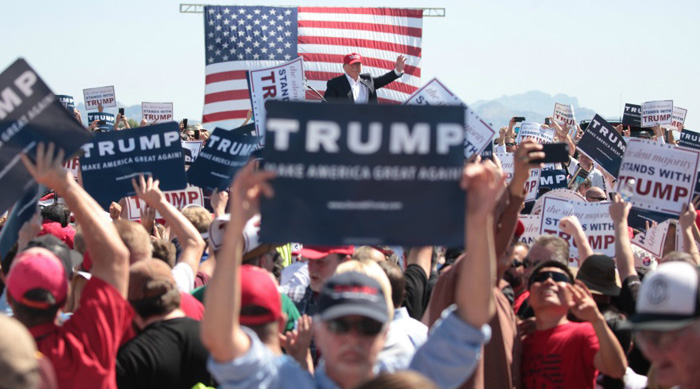YASCHA MOUNK
How did it come to this? In the space of a few short months, the prospect of a President Donald Trump has gone from preposterous speculation to terrifying possibility. How could a man with so little political experience and such manifest disregard for facts get so close to the White House?
In a much-discussed essay, Andrew Sullivan recently argued that “too much democracy” is to blame for Trump’s rise. According to Sullivan, the political establishment has been shoved aside by the anti-intellectualism of the far right and the anti-elitism of the far left. Meanwhile, the Internet has amplified the influence of the angry and the ignorant. What matters in politics today is not substance or ideology; it is a willingness to give voice to the people’s nastiest grievances – a skill at which Trump undoubtedly excels.
In an incisive response, Michael Lind argued that Sullivan gets things backwards: the real culprit is “too little democracy.” Trump, he points out, has fared best among voters who believe that “people like me don’t have any say.”
And there’s a reason why more and more voters feel that way. Some of the most important political decisions are now made by technocrats. Even in policy areas where elected representatives still call the shots, they rarely reflect citizens’ preferences.
At first glance, the explanations offered by Sullivan and Lind seem to be mutually contradictory. But, to make sense of the deepening crisis of liberal democracy – which has also emboldened far-right populists throughout Europe – we need to recognize that they are actually complementary.
The political systems of North America and Western Europe are defined by two core components. They are liberal because they seek to guarantee the rights of individuals, including those of marginalized minorities. And they are democratic because their institutions are supposed to translate popular views into public policy.
But in recent decades, as ordinary citizens’ living standards have stagnated and anger at the political establishment has skyrocketed, these two fundamental components of politics in the West have come into conflict. As a result, liberal democracy is bifurcating, giving rise to two new regime forms: “illiberal democracy,” or democracy without rights, and “undemocratic liberalism,” or rights without democracy.
In more and more countries, vast swaths of policy have been cordoned off from democratic contestation. Macroeconomic decisions are made by independent central banks. Trade policy is enshrined in international agreements that result from secretive negotiations conducted within remote institutions. Many controversies about social issues are settled by constitutional courts. In those rare areas, like taxation, where elected representatives retain formal autonomy, the pressures of globalization have attenuated ideological differences between established center-left and center-right parties.
It is hardly surprising, then, that citizens on both sides of the Atlantic feel that they are no longer masters of their political fate. For all intents and purposes, they now live under a regime that is liberal, yet undemocratic: a system in which their rights are mostly respected but their political preferences are routinely ignored.
Alienated from an unresponsive political establishment, voters are flocking to populists who claim to embody the pure voice of the people. Like Trump, they promise to cast aside the institutional roadblocks – from critical media and independent courts to international institutions like the EU or the World Trade Organization – that stand in the way of the collective will. But their nasty rhetoric should leave little doubt about what they hope to achieve: a clampdown on individual rights, particularly those of the people – from Mexicans to Muslims to muckraking journalists – whom they scapegoat in their speeches to such great effect.
In recent years, Hungary’s prime minister, Viktor Orbán, has demonstrated how easily a country can slide into illiberal democracy. And since late last year, the new Polish government has sought to realize Orbán’s playbook. If Marine Le Pen wins the French presidency next year, illiberal democracy may spread to the heart of Western Europe.
The rise of Trump, like that of right-wing populists in Europe, attests to the key political dynamic of our time: The specter of too much democracy that Sullivan fears has arisen from decades of too little. As political elites have become insulated from ordinary voters’ preferences, they have created a wide-open space for appeals – often tribal and profoundly chauvinist – to communal unity and popular self-defense.
There is still some hope of avoiding the disintegration of our political systems into either illiberal democracy or undemocratic liberalism. Perhaps the main short-term priority should be to implement economic policies aimed at raising ordinary citizens’ living standards – and thereby soften widespread anger at the political establishment.
But it also makes sense to experiment with new forms of political participation. In recent years, participatory budgeting, deliberative opinion polls, and even forms of “liquid democracy,” which allow citizens to choose whether to vote on a policy issue or delegate their vote to a surrogate, have all come into fashion. None of these innovations is a silver bullet. But each can help point the way toward institutions that balance individual rights and popular rule better than current arrangements.
If these measures turn out to be too little too late, or if the political establishment becomes so spooked by the populists that technocrats end up with even greater control over public policy, liberal democracy is unlikely to survive. In that case, we may confront the political equivalent of Sophie’s choice: sacrifice our rights to save democracy, or abandon democracy to preserve our rights.







Comments